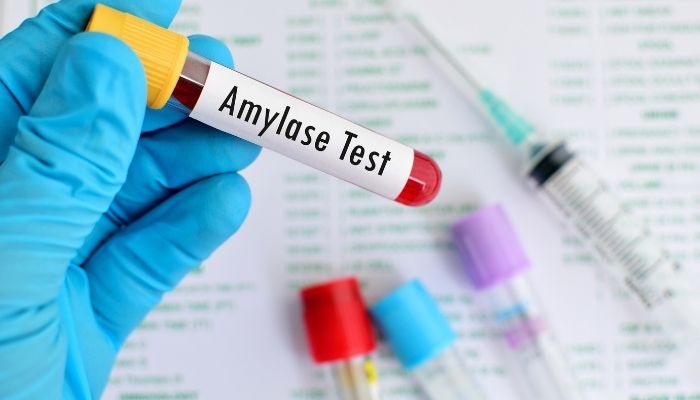An amylase test is a type of pathological test that measures the amount of amylase in your blood or urine. Amylase is a protein that helps in breaking down carbohydrates and starches into sugar. Amylase is primarily made by the pancreas and salivary glands. Though a small amount of amylase in your blood and urine is normal, a larger amount may indicate that you have a disorder of the pancreas, an infection, alcoholism, or other medical conditions.

The cost of the amylase blood test is Rs.260 to Rs.300, depending on your location and place. Please check the price of the amylase test in Delhi/NCR, your nearby centers and other details.
Test Summary of Amylase Test
| Also known as | Amy test, Serum Amylase, Urine Amylase |
| Test Type | Blood or urine |
| Amylase test includes | To check the levels of amylase in your blood or urine |
| Preparation | You don’t need any special preparations for this test. Inform your doctor if you are taking medications like aspirin, opiates, diuretics, etc. |
| Reporting | Within 24 hrs |
| Test price | The cost of the amylase blood test is Rs.260 to Rs.300, depending on your location and place. |
| Also included in | Health Insurance Plans |
| Related tests | Lipase blood test |
Purpose of the Amylase Test
An amylase blood test is primarily used to identify or monitor a condition of the pancreas like pancreatitis (inflammation of the pancreas). Your doctor may recommend an amylase urine test along with an amylase blood test. A urine test helps to diagnose and monitor pancreatitis and other salivary gland disorders. These tests are useful in monitoring amylase levels of people who are getting treatment for pancreatic or other disorders.Why does your doctor recommend this test?
In most cases, your doctor will recommend an amylase test along with a lipase test. Lipase is another enzyme that is produced by the pancreas to digest your body’s fats. These tests help your doctor to identify whether you have a disease of the pancreas, such as pancreatitis (inflammation of the pancreas) or not.Your doctor will also suggest an amylase test if you are suffering from other salivary gland diseases or if there’s a blockage in the duct. This blockage could be due to pancreatic cancer, gallstones, or a narrowing of the duct or the sphincter that splits the pancreatic duct from the bowel.
This test is also useful in checking people with cystic fibrosis (CF). This disease causes lung infections. As a result, your body can’t absorb nutrients from food. If your amylase level is high, this indicates that you have thick mucus plugs that are hindering digestive enzymes from moving from your pancreas to your small intestine.
Preparation of Amylase Test
You don’t need any special preparation for this test. But inform your doctor if you are taking medications like:- Vitamins or supplements
- Aspirin
- Birth control pills
- Opiates
- Diuretics
Procedure of Amylase Test
For an amylase blood test:- Once you reach your nearest lab or diagnostic center, a healthcare professional will take a blood sample from a vein in your arm.
- The person will tie up an elastic band to identify your vein.
- Once the vein will be identified, the person will insert a small needle to collect the blood sample.
- The collected blood sample will be deposited into a test tube or vial.
- Then, the sample will be sent to the laboratory for further testing.
For an amylase urine test,
- Wash your hands.
- Use a cleansing pad (provided by the diagnostic center or lab) to clean your genital area. Men should clean the tip of their penis. Women should open their labia and clean from front to back.
- Now, you need to urinate on the toilet
- Use the sample container under your urine stream
- Collect at least an ounce or two of urine into the container
- Complete your urination on the toilet
- Return the sample to the laboratory or your healthcare provider
Interpretation of the Results for Amylase Test
The normal amylase levels are 40 to 140 units per liter (U/L) or 0.38 to 1.42 microkat/L. Normal values may vary from lab to lab. High amylase levels may indicate various health conditions including:- Acute pancreatitis
- Improper kidney function
- Infection
- Pancreas, lungs, breast, and colon cancer
- Swollen salivary glands
- Mumps
- Appendicitis
- Chronic pancreatitis
- Liver disease
- Cystic fibrosis


